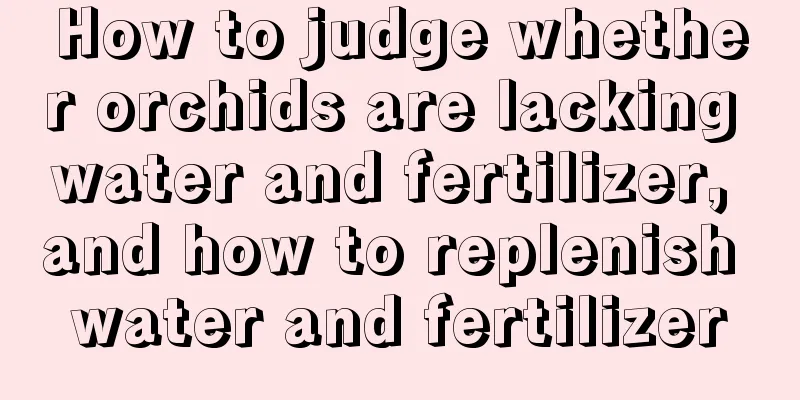How to judge whether orchids are lacking water and fertilizer, and how to replenish water and fertilizer

1. How to judge1. Lack of water: If the orchid is not watered for a long time, the soil in the pot will become too dry, or if the orchid is not watered regularly, the orchid will show symptoms of water shortage. The main symptoms are shrinking leaves, and the whole plant looks wilted; the rhizome becomes shriveled and yellow; the old leaves begin to turn yellow and dry from the tips, and the new leaves are not green and have no luster. 2. Lack of fertilizer: If the potting soil is too poor or the plant has not been fertilized for a long time, the orchid will show symptoms of malnutrition. The main symptoms are that the plants are weak, grow slowly and have no new buds or leaves; the old leaves gradually turn yellow from the base, and the new leaves become dull and lifeless. Plants will show different symptoms depending on the nutrients they lack. For example, when there is a lack of nitrogen fertilizer, the new leaves of the plant grow poorly and are thinner than the old leaves; when there is a lack of phosphorus, the leaf buds of the plant grow slowly and the edges of the leaves will be slightly curved. When magnesium is deficient, the leaves may turn yellow and so on. 2. How to solve it1. Rehydration: If the plant wilts due to lack of water, just replenish water in time and the orchid will recover. Then in the subsequent maintenance, when the soil in the pot becomes dry, you need to water it thoroughly to replenish moisture for the plant. 2. Supplement fertilizer: If the potting soil has not been changed for a long time and the soil has become too poor, you need to replace the flower soil and replant it in time. When growing orchids, try to change the potting soil once a year. If the plant has not been fertilized for a long time, you only need to replenish nutrients in time. You can apply corresponding fertilizers to the plants according to the different symptoms they show. If it is caused by lack of nitrogen fertilizer, applying urea once every 3 days can improve the situation; if it is caused by lack of phosphorus fertilizer, you can use potassium phosphate solution to irrigate the roots or spray it directly on the leaves, apply it once every 3 days, and the problem will improve after 3 times. If it is caused by a lack of magnesium fertilizer, you can spray the leaves with 0.5% magnesium sulfate solution every three days, and the problem will improve after about three times. |
<<: How to care for orchids in autumn and how to water orchids in late autumn
>>: What kind of soil do orchids like? Do they prefer acidic soil or alkaline soil?
Recommend
How much garlic yield per mu
Garlic yield per mu Garlic is a high-yield vegeta...
How often should I water the Hongyun Dangtou? The correct way to water it
How often should I water the Hongyun Dangtou? The...
Is the “food” in supermarkets really safe? Don’t buy these “4 types” of food for the sake of your family!
1. Fungus Fungus is one of the dried foods we eat...
The efficacy and function of pepper
1. Aid digestion The aroma of green pepper can st...
Cultivation Techniques of Gardenia jasminoides
1. Seeding and cultivation After collecting water...
How to make the spider plant bloom as soon as possible after it heads (what is the reason for the spider plant to head so many times)
The reason why spider plants produce a large numb...
Does Christmas cactus need sunlight? (Master these few tricks to meet the lighting requirements for Christmas cactus flowering)
Except when the temperature exceeds 32 degrees Ce...
How much water to water gardenia
1. How much water to pour 1. Amount of water: It ...
Cultivation method of colorful thousand-year-old wood
1. Soil The colorful elm prefers to grow in loose...
How often should we water asparagus fern? How often should we water asparagus fern in autumn and winter?
Asparagus fern is a representative of the "e...
Mint planting methods and precautions Potted mint cultivation methods and cultivation techniques
Mint cultivation methods and precautions There ar...
When to transplant hydrangeas planted in the ground
Hydrangea is a plant of the genus Hydrangea. It h...
How to prune a dragon blood tree (pruning time and method)
When to prune the dragon blood tree The best time...
How to divide orchids to increase the seedling rate (introduction to the precautions for division)
Generally speaking, after two or three years of o...
Why are the leaves of Anthurium turning yellow and dry?
1. Insufficient sunlight Reason: If you place ant...









